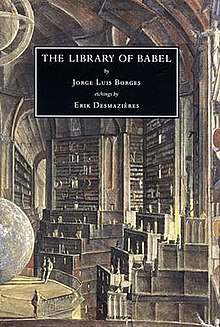The Library of Babel
| "The Library of Babel" | |
|---|---|

English language cover
|
|
| Author | Jorge Luis Borges |
| Original title | "La biblioteca de Babel" |
| Translator | numerous |
| Country | Argentina |
| Language | Spanish |
| Genre(s) | Fantasy |
| Published in | El Jardín de senderos que se bifurcan |
| Publisher | Editorial Sur |
| Publication date | 1941 |
| Published in English | 1962 |
"The Library of Babel" (Spanish: La biblioteca de Babel) is a short story by Argentine author and librarian Jorge Luis Borges (1899–1986), conceiving of a universe in the form of a vast library containing all possible 410-page books of a certain format and character set.
The story was originally published in Spanish in Borges' 1941 collection of stories El Jardín de senderos que se bifurcan (The Garden of Forking Paths). That entire book was, in turn, included within his much-reprinted Ficciones (1944). Two English-language translations appeared approximately simultaneously in 1962, one by James E. Irby in a diverse collection of Borges's works titled Labyrinths and the other by Anthony Kerrigan as part of a collaborative translation of the entirety of Ficciones.
Borges' narrator describes how his universe consists of an enormous expanse of adjacent hexagonal rooms, each of which contains the bare necessities for human survival—and four walls of bookshelves. Though the order and content of the books is random and apparently completely meaningless, the inhabitants believe that the books contain every possible ordering of just 25 basic characters (22 letters, the period, the comma, and the space). Though the vast majority of the books in this universe are pure gibberish, the library also must contain, somewhere, every coherent book ever written, or that might ever be written, and every possible permutation or slightly erroneous version of every one of those books. The narrator notes that the library must contain all useful information, including predictions of the future, biographies of any person, and translations of every book in all languages. Conversely, for many of the texts some language could be devised that would make it readable with any of a vast number of different contents.
...
Wikipedia
